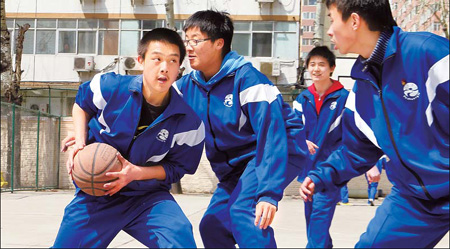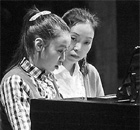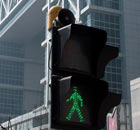Top Stories
City schools face student shortage
By Wang Wei (China Daily)
Updated: 2010-04-15 09:31
 |
Large Medium Small |
|
 Students of the middle school affiliated to the Beijing Institute of Fashion Technology play basketball on the playground. [Wang Jing / China Daily] |
Experts say admitting children without hukou can fix problem
The education authority released details last week it has cancelled high school places at five middle schools in the city due to a declining number of students, which educators say could be solved by offering places to students from outside of Beijing.
Last week, Beijing education commission released a list of middle schools that were eligible to admit high school students in 2009.
As many as 410 middle schools appeared on the list, 14 fewer than in 2008, with five deprived of the right due to a lack of students.
Despite the name, middle schools in China educate both middle school (aged 12 to 15) and high school (aged 16 to 18) students.
In 2005, there were more than 400 high school students at the middle school affiliated to the Beijing Institute of Fashion Technology - one of the five schools suspended from recruiting - but the number was dropped to 200 this year, said Wang Zhen, admission officer with the school.
Wang said families are moving out of the city center because of high living costs, with the result being a lack of students in downtown schools.
"Many teachers cried when they heard the news," Wang said. "It means they won't have enough students to teach."
He said there are 40 teachers in his high school department. Since there is no longer a 10th grade, as many as 13 will no longer be needed.
The situation will worsen over the following two years as the establishment's high school students graduate.
In addition to encouraging teachers to find jobs on their own, the school is trying to transfer redundant teachers to lower grades or recommend them to other education-related organizations, Wang said.
Chen Wei, a professor with population development studies center of Renmin University, told METRO the number of high school students in Beijing has been dropping since 2005. At that time, there were about 170,000.
He said this figure had dropped to 120,000 in 2009 and is expected to slip by 20,000 more over the next five years.
"The significant fluctuation of the population lays barriers for the government to do urban planning. Schools, hospitals and other public facilities have to frequently adjust their accommodation capability," Chen said.
He attributed the sharp decline of high school students to the tightening up of the one-child policy and increasing costs of raising a child in the mid-90s, when the country was experiencing swift economic growth.
Xiong Bingqi, vice-president of 21st Century Education Research Institute, said opening up schools to non-native Beijingers is a better idea than closing them down, in terms of utilizing educational resources properly.
He said students who don't have a Beijing hukou (residence permit) had to pay thousands of yuan in "sponsorship" fees each semester to study at high schools in Beijing.
Even if they study in Beijing, they have to return to their home city to take the university entrance exam.
"Therefore, studying in Beijing isn't very appealing to many non-native Beijingers," he said. "It is such a waste that experienced teachers don't have enough students to teach."
"Allowing non-native Beijingers to study at high schools in Beijing and take their university entrance exam is the best way to utilize education resources and enhance equality."







